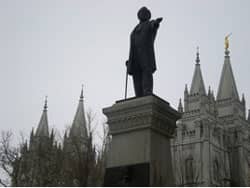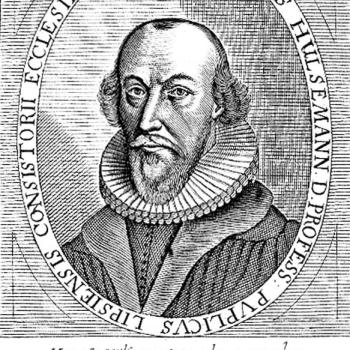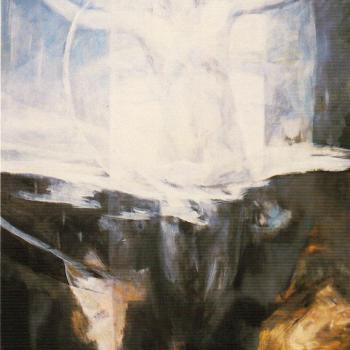
Brigham Young was the Prophet Joseph's most faithful disciple; their teachings are one as the minds of the Saints and prophets have always been one. Before he met Joseph Smith, Brigham recalls, "the secret feeling of my heart was that I would be willing to crawl around the earth on my hands and knees, to see such a man as was Peter, Jeremiah, Moses, or any man that could tell me anything about God and heaven." And then "when I saw Joseph Smith, he took heaven, figuratively speaking, and brought it down to earth; and he took the earth, brought it up, and opened up, in plainness and simplicity, the things of God; and that is the beauty of his mission."
It was a mind-stretching religion: "Thy mind, O man!" said the Prophet Joseph Smith, "if thou wilt lead a soul unto salvation, must stretch as high as the utmost heavens, and search into and contemplate the darkest abyss, and the broad expanse of eternity." The promise he gave to those who took the gospel and the cause of Judah to heart was that "your minds will expand wider and wider, until you can circumscribe the earth and the heavens... and contemplate the mighty acts of Jehovah in all their variety and glory."
What attests to him the divinity of the Bible is that it is "so much beyond the narrow-mindedness of men, that every man is constrained to exclaim: 'It came from God.'" The Holy Ghost, the ultimate teacher, "has no other effect than pure intelligence. It is more powerful in expanding the mind, enlightening the understanding, and storing the intellect with present knowledge... It is... the pure spirit of intelligence."
Mind and heart must expand together, according to the Prophet: "You must enlarge your souls towards each other... Let your hearts expand, let them be enlarged towards others." For not only is "the mind or the intelligence which man possesses... co-equal with God himself" in time, but "all the minds and spirits that God ever sent into the world are susceptible of enlargement... so that they... have one glory upon another."
This was what Brigham Young learned from his beloved Joseph as he "continued to receive revelation upon revelation, ordinance upon ordinance, truth upon truth." It was all good news: "What are we here for? To learn to enjoy more, and to increase in knowledge and in experience." Learning is our proper calling: "We shall never cease to learn, unless we apostatize... Can you understand that?" "God has given us mental and physical powers to be improved," and along with them "our senses, if properly educated, are channels of endless felicity to us." All systems are "go" for the expanding mind: "Let us not narrow ourselves up; for the world, with all its variety of useful information and its rich hoard of hidden treasure, is before us; and eternity, with all its sparkling intelligence, lofty aspirations, and unspeakable glories, is before us." The news is all good -- forever: "And when we have passed into the sphere where Joseph is, there is still another department, and then another, and another, and so on to an eternal progression in exaltation and eternal lives. That is the exaltation I am looking for." "When we have lived millions of years in the presence of God and angels, ...shall we then cease learning? No, or eternity ceases." First and last, the gospel is learning unlimited.
***
President Young kept after his people all the time: "After suitable rest and relaxation there is not a day, hour or minute that we should spend in idleness, but every minute of every day of our lives we should strive to improve our minds and to increase in the faith of the holy Gospel." A year after the arrival in the valley, Brigham Young copied down in his journal a letter which Parley P. Pratt had written to his brother back east describing the new society: "All is quiet -- stillness. No elections, no police reports, no murders, no war nor little war... No policeman has been on duty to guard us from external or internal dangers... Here we can cultivate the mind, renew the spirit, invigorate the body, cheer the heart and ennoble the soul of man. Here we can cultivate every science and art calculated to enlarge the mind, accommodate the body, or polish and adorn our race; and here we can receive and extend that pure intelligence which is unmingled with the jargon of mystic Babylon."
Wonderful to relate, for the ever-practical Brigham and the struggling pioneers the improvement of the mind always came first. Brigham laid it on the line: "All who do not want to sustain co-operation and fall into the ranks of improvement, and endeavor to improve themselves by every good book" were invited to leave the community. The challenge of nature was not the real issue -- "the greatest and most important labour we have to perform is to cultivate ourselves."




